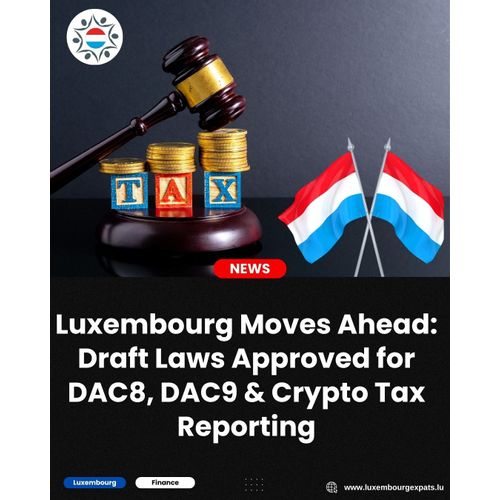Luxembourg Approves Draft Laws for DAC8, DAC9, and Crypto Tax Reporting
LuxembourgPosted on 30 July 2025 by TeamLuxembourg’s Council of Ministers has approved two draft laws to align the country’s tax legislation with the European Union’s evolving administrative cooperation framework and international tax transparency standards. These measures address global tax challenges, particularly in the areas of multinational enterprise taxation and crypto-asset reporting.
The first draft law transposes EU Council Directive 2025/872 into Luxembourg’s domestic legal framework, implementing the OECD’s Pillar Two global minimum tax rules. This directive establishes a standardized digital format for the automatic exchange of information (AEOI) for multinational enterprise (MNE) groups and large domestic groups. The measure ensures these entities comply with the global minimum tax framework, promoting fair taxation across jurisdictions.
The second draft law incorporates EU Council Directive 2023/2226, which integrates the Crypto-Asset Reporting Framework (CARF) into Luxembourg’s tax system. This framework expands reporting obligations to include crypto-assets and digital payment methods, broadening the scope of AEOI. The inclusion of CARF aims to enhance transparency in the rapidly growing digital asset sector, ensuring tax authorities can monitor and verify transactions involving cryptocurrencies and other digital financial instruments.
Additionally, the draft laws amend Luxembourg’s existing tax transparency frameworks. These updates affect administrative cooperation in taxation, the common reporting standard (CRS), country-by-country (CbC) reporting, reportable cross-border arrangements under DAC6, and information exchange obligations for digital platform operators under DAC7. The revisions strengthen Luxembourg’s compliance with international standards, facilitating cross-border cooperation and improving oversight of tax-related activities.
Practical Implications for Individuals and Businesses
For businesses, particularly multinational enterprises and large domestic groups operating in Luxembourg, the implementation of the OECD’s Pillar Two rules means increased compliance requirements. These entities will need to adopt the standardized digital format for AEOI, ensuring their tax reporting aligns with the global minimum tax framework. This could lead to higher tax liabilities for companies previously benefiting from lower effective tax rates in certain jurisdictions, as the rules aim to ensure a minimum 15% tax rate on profits. Businesses will need to invest in robust tax reporting systems and potentially adjust their financial strategies to comply with these regulations.
For individuals and businesses engaged in crypto-asset transactions, the introduction of the CARF will significantly enhance tax reporting obligations. Crypto exchanges, wallet providers, and other service providers in Luxembourg will be required to collect and report detailed transaction data to tax authorities. This includes information on crypto-asset trades, transfers, and payments made through digital means. Individuals trading or holding cryptocurrencies will face greater scrutiny, as tax authorities gain access to comprehensive data to verify tax compliance. This could result in increased tax assessments for unreported crypto gains, requiring individuals to maintain accurate records of their transactions.
The updates to existing frameworks, such as CRS, CbC reporting, DAC6, and DAC7, will further tighten compliance requirements. Businesses operating cross-border or through digital platforms will need to ensure their reporting systems are updated to meet these standards, potentially increasing administrative costs. For individuals, particularly those with cross-border financial activities or income from digital platforms, these changes mean a higher likelihood of tax authorities detecting discrepancies in reported income, emphasizing the need for accurate and timely tax filings.
These legislative proposals reflect Luxembourg’s commitment to maintaining its position as a cooperative jurisdiction in global tax governance. By aligning with EU directives and OECD frameworks, the country seeks to enhance its tax compliance infrastructure while supporting international efforts to combat tax evasion and promote transparency.
The draft laws now await parliamentary approval before they can take effect. Once enacted, they are expected to bolster Luxembourg’s role in fostering a transparent and equitable global tax environment. Businesses and individuals should prepare for these changes by reviewing their tax reporting processes and seeking professional advice to ensure compliance with the new regulations.
Join Luxembourg Expats — Where expats find friends, homes, news, and businesses — every day. luxembourgexpats.lu
I am your contact
Team
Chat









